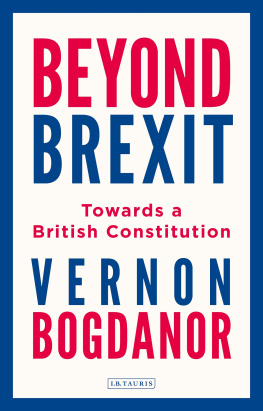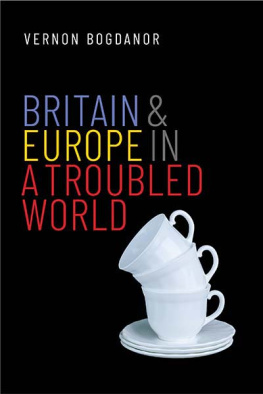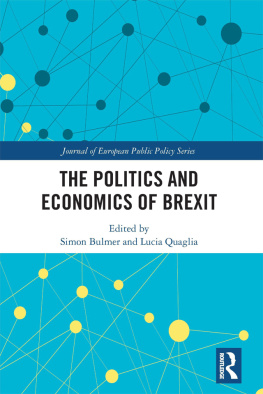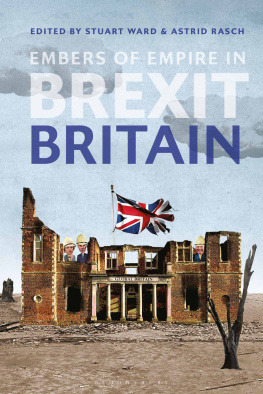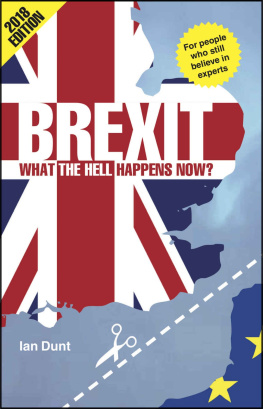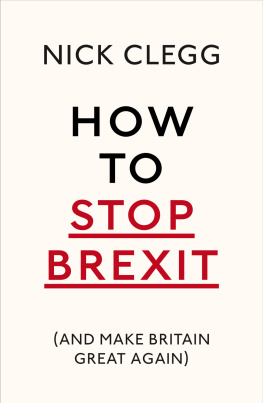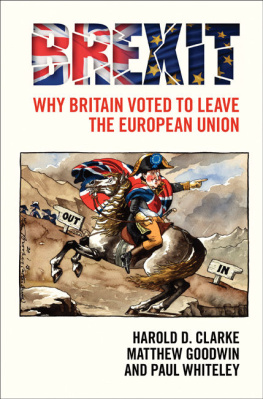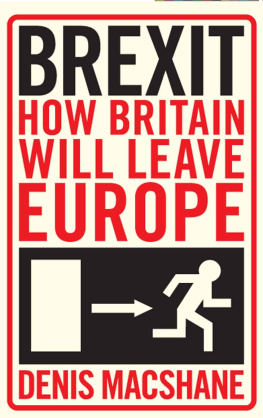Acknowledgments
An earlier version of this book was scrutinised to its great benefit by Dr Rudolf Adam, Professor Conor Gearty, Sandy Sullivan, Dame Veronica Sutherland and Professor Derrick Wyatt, QC.
Much of Chapter 5 is based on a pamphlet I published for the Constitution Society in 2018 entitled Brexit and Our Unprotected Constitution. I am grateful to the society for allowing me to re-use this material. This pamphlet was read in draft form by Lord Anderson QC, Professor Catherine Barnard, Dr Andrew Blick, Agata Gostynska-Jakubowska, Stephen Hockman QC, Sir Stephen Laws QC, Professor T.G. Otte, Lord Pannick QC, Anthony Speaight QC and Anthony Teasdale, all of whom made helpful comments.
I am particularly grateful to Andrew Blick who first suggested to me that Brexit might prove a constitutional moment and gave me the impetus to write this book.
But these generous friends are not in any way to be implicated in my arguments or conclusions. Indeed, I know that some of them will disagree with what I have written.
I should also like to thank my long-suffering publisher, Iradj Bagherzade and the incomparable London Library for meeting my requests for books so speedily and efficiently.
But my greatest debt is to my wife, Sonia, who has not only read and criticized an earlier draft of this book, but encouraged me at every stage.
Vernon Bogdanor
Kings College, London,
September 2018
Introduction
Brexit is a momentous event. But so far discussion of it has been almost wholly confined to its economic consequences. Yet, Brexit will also affect the way we are governed. It will have fundamental consequences for our politics and our constitution. Entry into Europe in 1973 had a seismic effect on politics and the constitution. Brexit could be equally seismic.
Before we entered the European Community, as the European Union then was, in 1973, Parliament was thought to be sovereign. It could, it was believed, do what it liked. Judges did not, so most people thought, have the power, which they enjoyed in many other democracies, to strike down legislation as unconstitutional or contravening basic rights. Joining the European Community meant subordinating United Kingdom law to European law. It meant subordination to a higher legal order. In 1991, the judges disapplied part of an Act of Parliament because it went against European law, something which it had previously been thought they could not do. The judges took for themselves the power to review primary legislation in terms of its compatibility with European law.
Before we entered the European Community, our rights were protected primarily by Parliament, not by the judges. Our rights seemed at the mercy of government and MPs. But Europe gave us the Charter of Fundamental Rights, a Charter protecting rights against Parliament when Parliament legislated on European Union matters and, indeed, providing much more extensive protection of human rights than the Human Rights Act which was enacted in 1998.
Before we entered the European Community, the referendum was thought to be unconstitutional, a device in the words of Clement Attlee alien to all our traditions. Yet, just two years after joining, in 1975, we had our first national referendum on whether we should remain. Since then we have had two further national referendums, climaxing in the Brexit referendum of 2016 and many referendums at sub-national level. The referendum has now definitely become part of the furniture of the British constitution.
Before we entered the European Community, there was much less constitutional debate than there is today. Indeed, many, even on the Left, felt that there was really little point in debating it, since it was hardly capable of improvement. In 1953, a visiting American academic, attending a dinner party at a British university, was surprised to hear an eminent man of the left to say in utter seriousness that the British Constitution was as nearly perfect as any human institution could be. He was even more surprised that No one even thought it amusing.
But will Brexit turn the clock back to the era before 1973? It seems unlikely. Membership of the European Union has swept away too many of our traditional landmarks for it to be possible to resurrect them. We will remain marked by our European commitment, short-lived though it has proved to be. Too much has changed and the past is indeed another country.
Brexit, however, will give rise to two constitutional problems. The first is how our rights are in future to be protected. Membership of the European Community shifted power from government and Parliament to the courts. But, as Chapter 5 shows, Brexit means that we will no longer enjoy the protection of the European Charter of Fundamental Rights, a Charter which indeed gave us much more extensive protection than the Human Rights Act. Will we be happy in future for our rights to be protected by government and Parliament rather than the courts or do we need the judges to ensure that our rights are preserved?
Furthermore, Brexit will transform the relationship between the British Government and the government of the devolved bodies in Scotland, Wales and Northern Ireland. We will have to re-think the balance of power between Holyrood, Cardiff Bay, Stormont and Westminster. Brexit also resurrects the English Question. England, of course, remains the only part of the United Kingdom without a devolved body to represent its interests. Englands interests are represented by the British Government, which has an awkward dual role as the government of the United Kingdom as well as the government of England. Brexit, therefore, calls into question the current territorial division of powers and raises once again the question of how the United Kingdom is to be preserved. So, Brexit involves not just a new relationship between Britain and the Continent, but perhaps also a new relationship between the various components of the United Kingdom.
The greatest barrier to resolving all these difficult problems lies in the tenacious hold upon us of the concept of the sovereignty of Parliament, a concept undermined and perhaps abrogated by our membership of the European Community. Sovereignty is an absolute concept. Like virginity, once it is lost, it cannot be regained. Perhaps then, the problems raised by Brexit can only be resolved by further limiting the sovereignty of Parliament. Indeed, the central theme of Beyond Brexit is that the constitutional problems likely to result can only be resolved by radically rethinking our constitutional arrangements and moving towards a written or codified constitution. Brexit, therefore, could prove a constitutional moment. It will mark an end to our membership of the European Union. But it could also mark a new beginning in our constitutional development.
Beyond Brexit, then, has a specific but important theme the effects of Britains forty-five year membership of the European Union on the British constitution and the likely constitutional consequences of Brexit. Beyond Brexit steers clear of the debate on the merits or demerits of Brexit; it is not concerned with the negotiations between the British Government and the European Union nor the parliamentary processes by which Brexit is being achieved

